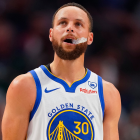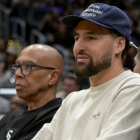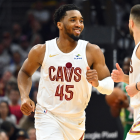 |
| Will the rookie from Ohio State make the starting lineup? (Getty Images) |
The Boston Celtics had one of the worst offenses in the NBA last season, and it could be a rookie power forward who helps bring them back.
Paul Flannery of WEEI.com has been listening to the players and coaches beam about Jared Sullinger this preseason. And after watching the Celtics excel with him on the court this preseason, he's making the case for why Sully should be inserted into the opening night starting lineup:
Starter/reserve are tricky designations in the NBA, particularly when it involves a 20-year-old rookie and a seven-year veteran who just recently signed a new 3-year contract. Just a guess, but that's one of the reasons why Rivers is being so deliberate with his plan. Another is that he really isn't sure yet, and a third is that he's using the preseason to gauge who can play where and with whom, so he can take advantage of a tremendously deep and versatile roster. That's not playing coy, that's being smart.
And yet, through six preseason games, Sullinger has stood out both for his on-court play -- 11 points, 7 rebounds, 56 percent shooting in 25 minutes -- and for his demeanor. His notoriously hard to impress veteran teammates have embraced him in a way that would seem impossible around these parts.
Flannery makes sure to explain this isn't because Brandon Bass has been bad. In fact, he's been pretty good since joining the Boston Celtics. It's just that Sullinger is a rebounder who can do a lot of the same things Bass can do on the court.
Bass hasn't had a rebounding rate over 13.0 percent since he was in Dallas in the 2008-09 season. He has struggled to help end possessions with his rebounding, and that can put quite a toll on the Celtics' veterans. Sullinger would inject some more life, especially on the boards where he was a big-time rebounder at Ohio State.
The issue with potentially disrupting chemistry by starting a rookie over a seven-year veteran is you might insult a player who helped your team immensely when he was on the court. As Flannery points out:
Bass brings his own set of strengths to the equation. He is one of the best outside-shooting big men in the game, and when he's on the court with Garnett that opens up the floor. That's extremely important because the C's relied almost exclusively on spacing and ball movement to create shots last season. When Garnett and Bass were on the floor together, the Celtics scored 105.8 points per 100 possessions, a huge jump from their otherwise anemic offensive production last season.
Bass is the very definition of a solid pro, and he's the kind of player you want on your team. Again, he's done nothing wrong this preseason, but Sullinger has a chance to be special. What's the best way for him to reach his potential? By playing him alongside Garnett whenever possible.
The Celtics had the 24th-ranked offense (98.9 points per 100 possessions) last season, according to NBA.com/stats. The starting lineup of Rajon Rondo, Ray Allen, Paul Pierce, Kevin Garnett and Bass managed to average 103.4 points per 100 possessions. Of the top 20 most played lineups from last season, that Celtics five-man unit ranked 12th in offensive rating.
By moving Sullinger into the lineup next to Garnett and keeping Bass' pick-and-pop specialty for the second unit, it could help boost their bench scoring. According to hoopsstats.com, the Celtics ranked 29th in bench points last season -- just 0.9 points per game ahead of the last-place Lakers bench.
Flannery certainly makes a good case for starting Sullinger. Depending on if they bring Courtney Lee or Jason Terry into the starting lineup until Avery Bradley returns from his shoulder injury, Boston could see a huge boost in both the starters' scoring and bench scoring.
Either way, the deeper roster this season should take away a lot of the scoring problems the Celtics had last season and keep their veterans fresh for the playoffs.

















